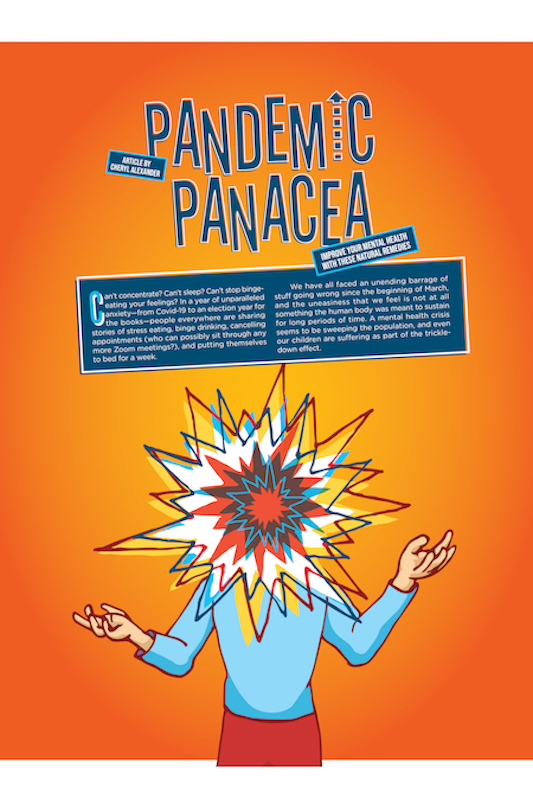We have all faced an unending barrage of stuff going wrong since the beginning of March, and the uneasiness that we feel is not at all something the human body was meant to sustain for long periods of time. A mental health crisis seems to be sweeping the population, and even our children are suffering as part of the trickle-down effect.
While there is nothing we can do to change the election results or speed up a coronavirus vaccine, we can do some things to take better care of ourselves. Neuroscientists, psychologists, and meditation experts have offered guidance about how we can ease our minds. Here are a few ideas we can try to help ourselves calm down, gain perspective, and fortify our dispositions for whatever might be next.
1. Deep Breathing. With this powerful breathing exercise, you simply take long, slow, deep breaths (also known as abdominal or belly breathing), gently disengaging your mind from distracting thoughts and sensations to focus solely on the length and pace of the breath. This technique also involves holding your breath. To practice, inhale through your nose for a count of four, then hold your breath for a count of seven. Let the breath out slowly from the mouth for a count of eight. Ideally, you should practice this technique a couple of times a day for about 10 rounds. Then, when you find yourself in a stressful situation, you can pause and use this breathing method to help you regain control of your heart rate and racing thoughts. Your stress levels will drastically go down.
2. Body scan. This technique blends breath focus with progressive muscle relaxation. After a few minutes of deep breathing, you focus on one part of the body or group of muscles at a time and mentally and physically release any physical tension you feel there. A body scan can also enhance your mind-body connection. If you find this difficult at first, try imagining the body part illuminates as you focus on it. For example, with your eyes closed and your breath long and steady, think of your right foot and pull a deep breath into the foot. As the breath arrives there, imagine the foot lighting up. Then move up to the ankle, and imagine it illuminating as the breath arrives, then the lower leg, etc. Allow the warmth of the breath and the warmth of the light to relax your body.
3. Guided imagery. For this technique, you conjure up soothing scenes, places, or experiences in your mind to help you relax and focus. This type of visual therapy can help an anxious person create in their mind a place where they feel calm and relaxed. You can find free apps and online recordings of calming scenes—just make sure to choose imagery you find soothing and that has personal significance. The imagery differs for each person. For some, their safe place could be nestled at home in bed, while others could find peace if they visualize the face of a loved one.
4. Mindfulness meditation. This practice involves sitting comfortably, focusing on your breathing, and bringing your mind’s attention to the present moment without drifting into concerns about the past or the future. You might easily begin a meditation practice by following these steps:
• Step 1: Sit in a quiet place. Take a few deep breaths to connect to the innate intelligence of your whole body, ground down, and access your intuition and inner guidance.
• Step 2: Sit quietly with your eyes closed. Relax. Breathe deeply and listen for the divine guidance. It can come in any form: a vision, an expression, an epiphany, a quiet inner knowing, etc. Meditation is when the divine talks to you. You can set your timer for 10-15 minutes for this process.
• Step 3: Journal for 10-15 minutes. Divine guidance can come in many different forms. The process of automated writing (when you write even if you have no particular thoughts) is a powerful experience. Trust that your intuition can guide you through journaling, too.
5. Yoga, tai chi, and qigong. These ancient arts combine mindful breathing with a series of postures or flowing movements. The physical aspects of each require a mental focus that will distract you from racing thoughts, clear distracting glitches that keep you from accomplishing your goals, and deliver mental clarity. Afterwards, the practitioner will experience a feeling of euphoria and calm that will translate into your daily routine so that you are more relaxed before entering any potentially stressful situation.
6. Repetitive prayer. For this technique, you silently repeat a short prayer or phrase from a prayer while practicing breath focus. This method may be especially appealing if religion or spirituality is meaningful to you. You can say something like this: “Thank you for your guidance, your grace and favor, and my abundant blessings. Thank you for showing me the way. I choose to surrender. I trust your infinite love. I trust your loving guidance. I love you. Thank you.”
7. Tea and aromatics. If you are feeling especially jittery, a nice warm cup of chamomile tea can help soothe away negative feelings associated with anxiety. Some contents of chamomile—Matricaria recutita in particular—will bind to the same brain receptors as anti-anxiety drugs. Also, the mere smell of some aromatics, such as lavender, can relieve anxiety. One study cites that dental patients experience less anxiety when the waiting room is filled with the scent of lavender.
8. Exercise. While exercise is a great way to stay in physical shape, it can also give you a break from feeling anxious (many sources say 21 minutes of exercise is effective enough). It does not have to be high-impact activity, either. Even a brisk walk or other simple activity can deliver several hours of relief, much like taking an aspirin for a headache.
9. Omega-3. This fatty acid has positive impacts on your brain. Foods with Omega-3, like tuna, salmon, walnuts, and flax seeds, can lower stress chemicals that can worsen anxiety.
10. Sunlight. You might not feel like going outside when you are depressed, but sunshine offers a great pay off for easing anxiety. Not getting enough sunlight can cause a drop in Vitamin D, which plays an important part in mental health, according to CalmClinic.com. This source offers an online test to determine how severe your anxiety is so you can properly approach it.
12. Laughing. You may not feel like laughing when under stress, but even “fake” laughing can relieve anxiety. When you laugh, your brain releases dopamine, a brain chemical associated with pleasure. You can use a laugh track app on your phone to get into a funny mood or watch a funny movie. One study even suggests that even anticipating laughter can reduce the amount of cortisol, a stress hormone, from your bloodstream.
Rather than choosing just one technique, experts recommend trying on several to see which will work best for you. Try to practice for at least 20 minutes a day, although even just a few minutes can help. But the longer and the more often you practice these techniques, the greater the benefits and the more you can reduce stress.



